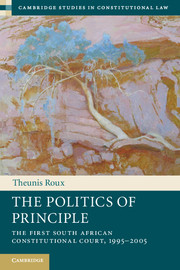Book contents
- Frontmatter
- Contents
- Acknowledgements
- Introduction
- Part I Problematic, Theory, Methodology
- Part II Context
- Part III Thematic Case Studies
- 6 Death, desire and discrimination: the Chaskalson Court between constitutional and positive morality
- 7 Social rights
- 8 Property rights
- 9 Political rights
- 10 Cross-cutting strategies
- Conclusion
- Bibliography
- Index
- References
7 - Social rights
Published online by Cambridge University Press: 05 April 2013
- Frontmatter
- Contents
- Acknowledgements
- Introduction
- Part I Problematic, Theory, Methodology
- Part II Context
- Part III Thematic Case Studies
- 6 Death, desire and discrimination: the Chaskalson Court between constitutional and positive morality
- 7 Social rights
- 8 Property rights
- 9 Political rights
- 10 Cross-cutting strategies
- Conclusion
- Bibliography
- Index
- References
Summary
There is a curious divergence of opinion in the academic literature on the Chaskalson Court’s social rights jurisprudence. For almost all foreign commentators, this aspect of the Court’s record represents the summit of its achievement – the area of its work where the Court distinguished itself as one of the most technically accomplished and innovative of the constitutional courts established after 1989. For most South African commentators, by contrast, the Court’s decisions on social rights constitute the one respect in which it clearly failed to deliver on the promise of the 1996 Constitution.
As we saw in Chapter 1, Dworkin and Sunstein’s appreciation of the Chaskalson Court’s record is based on what they regard to be its creative and institutionally self-aware decisions in Grootboom and Treatment Action Campaign. To this may be added the largely positive accounts of these decisions given by Frank Michelman, Mark Tushnet, Rosalind Dixon, Ran Hirschl, Katharine Young, and Mark Kende. For all of these commentators, the Court’s approach to its social rights mandate was both astute in its handling of the separation of powers issues at stake and also instructive about the sort of role constitutional courts may play in relation to these rights.
- Type
- Chapter
- Information
- The Politics of PrincipleThe First South African Constitutional Court, 1995–2005, pp. 262 - 303Publisher: Cambridge University PressPrint publication year: 2013
References
- 1
- Cited by

